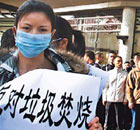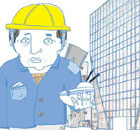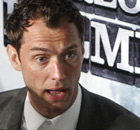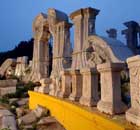Global General
Haiti says 200,000 may be dead, violence breaks out
(Agencies)
Updated: 2010-01-16 10:50
 |
Large Medium Small |
PORT-AU-PRINCE: As many as 200,000 people died in the earthquake that devastated Haiti and three-quarters of the capital, Port-au-Prince, will need to be rebuilt, authorities in the Caribbean country said on Friday.
"We have already collected around 50,000 dead bodies. We anticipate there will be between 100,000 and 200,000 dead in total, although we will never know the exact number," Interior Minister Paul Antoine Bien-Aime told Reuters.
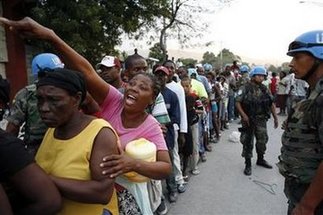 People line up for food distributed by UN forces in Port-au-Prince, January 14, 2010. [Agencies] |
If the casualty figures turn out to be accurate, the 7.0 magnitude quake that hit impoverished Haiti on Tuesday would be one of the 10 deadliest earthquakes ever recorded.
Three days after it struck, gangs of robbers had begun preying on survivors living in makeshift camps on sidewalks and streets strewn with rubble and decomposing bodies, as quake aftershocks rippled through the hilly neighborhoods.
Louis said President Rene Preval and Prime Minister Jean-Max Bellerive were living in and coordinating the government response from the judicial police headquarters near the airport and their main concern was that desperation was turning to violence.
Governments and aid groups around the world poured relief supplies and medical teams into the Caribbean state -- already the poorest in the Western Hemisphere.
US Secretary of State Hillary Clinton was due to visit on Saturday and U.N. Secretary-General Ban Ki-moon said he would go "very soon" as major powers raced to save lives, speed up supplies and avert unrest in a state with a history of internal conflict.
Planes and ships arrived with rescue teams, search dogs, heavy equipment, tents, water purification units, food, doctors and telecoms teams. But with a clogged airport, wrecked seaport and roads littered with rubble, as well as the sheer scale of the destruction, aid was not yet reaching hundreds of thousands of victims.
The US State Department said Haiti's government granted temporary control of the nation's main airport to the United States to speed earthquake relief work.
DAMAGE OUTSIDE THE CAPITAL
Raggedly dressed survivors held out their arms to reporters touring the city, begging for food and water.
"We have lost everything. We are waiting for death. We have nothing to eat, nowhere to live. We have had no help. No one has come to see us," said quake victim Andres Rosario, speaking at an improvised camp set up by survivors at a rubbish dump in Port-au-Prince.
"Three-quarters of Port-au-Prince will have to be reconstructed, not just the areas totally destroyed, but also the places where so many houses have structural damage," Health Minister Alex Larsen told Reuters.
Reports began to trickle in of heavy damage in the southern coastal city of Jacmel and other areas outside the capital.
US President Barack Obama, who pledged an initial $100 million for Haiti quake relief, promised the United States would do what it takes to save lives and get the country back on its feet. "The scale of the devastation is extraordinary ... and the losses are heartbreaking," Obama said at the White House.
ROADBLOCKS WITH CORPSES
The US military aimed to have about 1,000 troops on the ground in Haiti on Friday, and thousands more in ships offshore. The total will reach 9,000 to 10,000 troops by Monday.
"Help is near. More help is on the way. We are doing everything we can but it will take days to get help to all the places we need to," said Lieutenant General Ken Keen, coordinating the US military effort.
US Navy helicopters had begun taking water ashore and ferrying injured people to a field hospital near the airport.
Police were scarcely seen on the streets, and although some Brazilian U.N. peacekeepers were patrolling, there were reports of sporadic scavenging, some looting and one report of gunshots in downtown Port-au-Prince on Friday.
"I heard the shots and got out of there. The police told us it was too dangerous to stay. People were looting and a body was being burned," said a foreign photographer, who asked not to be identified.
At one destroyed supermarket, scores of people swarmed over the rubble to try to reach the food underneath. Just outside the Cite Soleil slum, desperate people crowded around a burst water pipe jostling to drink from the pipe or fill up buckets.
Some survivors, angry over the delay in getting aid, built roadblocks with corpses on Thursday in one part of the city.
"Some aid is slowly getting through, but not to many people," said Margaret Aguirre, a senior official with International Medical Corps.
The United States said the arrival of its nuclear-powered aircraft carrier USS Carl Vinson with 19 helicopters on Friday would open a second significant channel to deliver help.
NO WATER, NO SUPPLIES
The Pan American Health Organization said at least eight hospitals and health centers in Port-au-Prince had collapsed or sustained damage and were unable to function.
"We have no supplies. We need surgical gloves, antibiotics, antiseptic, disinfectant. We have nothing. Not even water. We have children out here with dry mouths and no water to give them," said one doctor, Jean Dieudonne Occelien.
Health experts say that while dead bodies smell unpleasant, in cases where people have been killed by trauma and not by contagious diseases such as cholera, there is little health risk from even large numbers of decomposing corpses.
The U.N. peacekeeping mission in Haiti, which has lost at least 36 of its personnel in the quake, was trying to provide some basic coordination from an office near the airport.






